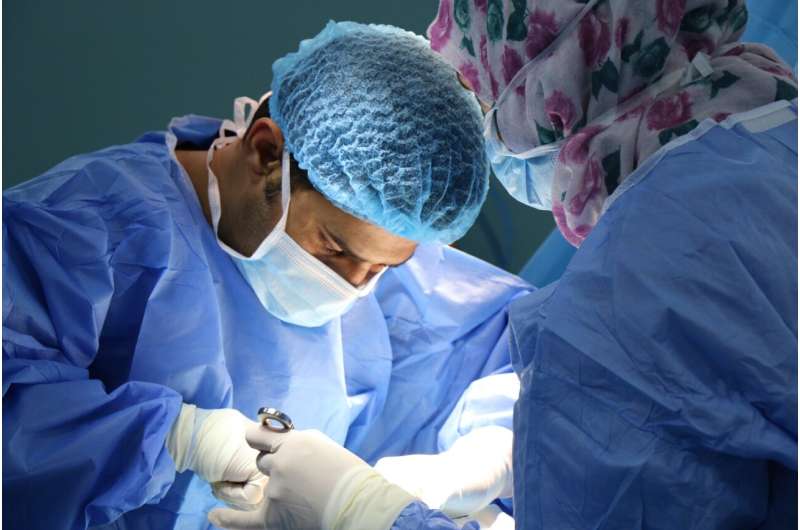This article has been reviewed according to Science X's editorial process and policies. Editors have highlighted the following attributes while ensuring the content's credibility:
fact-checked
trusted source
proofread
Study shows 1 in 25 patients undergoing structural cardiac intervention suffered a major complication

Researchers at the University of Alabama at Birmingham Marnix E. Heersink School of Medicine published a study in the Journal of the American Society of Echocardiography showing that transesophageal echocardiography (TEE)-guided transcatheter structural cardiac intervention was associated with a major complication in 3.6% of patients.
A TEE-guided transcatheter structural cardiac intervention occurs when a cardiologist guides a echocardiography transducer—a device that uses sound waves to create an ultrasound of the heart—into the esophagus to obtain higher-quality images of the heart compared to a typical echocardiography. This procedure is often used for real-time visualization during procedures aimed at treating defects in heart valves or chambers.
"In patients who are not good candidates for open-heart surgery, minimally invasive procedures known as percutaneous transcatheter interventions are preferred," said Ammar Hasnie, M.D., a resident in the UAB Department of Medicine and first author of the manuscript.
"During this procedure, cardiologists insert a thin, flexible catheter through a small incision in the skin and complete the intervention with TEE guidance. Although TEE-guided structural interventions have become more common over the years, the complications due to the probe used during the procedure have not been studied previously."
The research team analyzed the clinical outcomes of more than 12,000 patients who had a TEE-guided percutaneous transcatheter intervention from the TriNetX database. Over the past decade, 3.6% of patients who had this procedure had complications—the most frequently reported was gastrointestinal bleeding. Major risk factors for complications included advanced age and medications such as antiplatelet or anticoagulant therapy.
"Though TEE is an excellent tool to guide minimally invasive interventions in the heart, it is not a procedure free of risk," Hasnie said. "Long probe-manipulation time during transcatheter structural cardiac interventions can lead to a higher frequency of TEE-related complications. This is especially important to consider in older patients with multiple comorbidities."
"These findings have major implications for patients undergoing structural intervention with TEE guidance," said Garima Arora, M.D., the senior author of the paper and director of Interventional Echocardiography and co-director of Echocardiography and Cardiac MRI at UAB.
"This study noted that patients undergoing a percutaneous intervention had a higher risk of suffering a complication compared to cardiac surgery. As more patients undergo minimally invasive structural interventions, it is important to be aware of the risks associated with the TEE probe itself."
Arora noted that this largest-to-date, nationwide study will help guide cardiologists in patient selection and allow for a more thorough risk assessment for TEE-guided percutaneous transcatheter cardiac interventions. This contemporary-era study will serve as a guide for comprehensive risk discussion with patients undergoing a minimally invasive structural cardiac intervention with TEE guidance.
More information: Ammar A. Hasnie et al, Complications Associated With Transesophageal Echocardiography in Transcatheter Structural Cardiac Interventions, Journal of the American Society of Echocardiography (2023). DOI: 10.1016/j.echo.2022.12.023



















